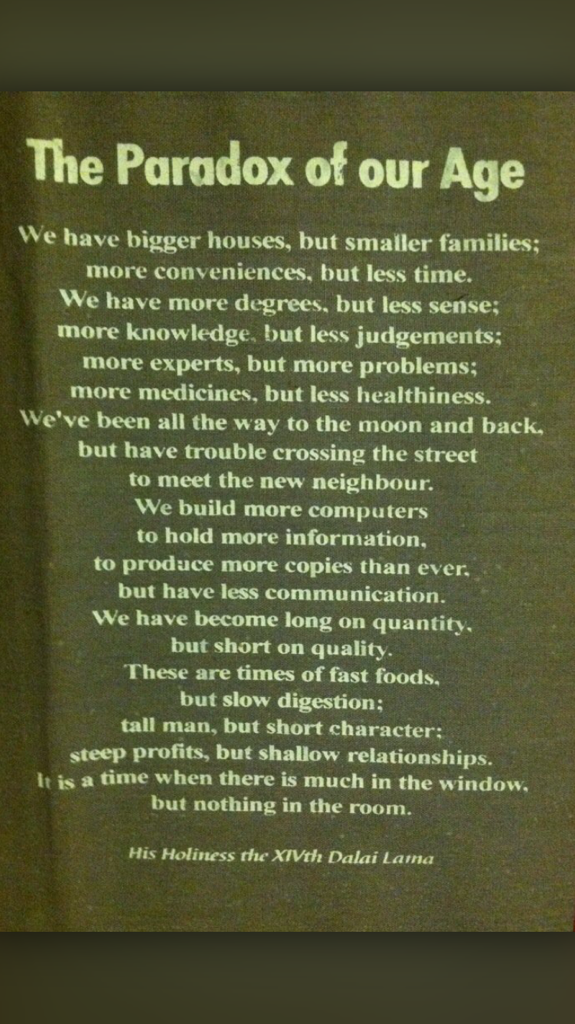Greetings,
Physical health education has come a long way in understanding some of the sound guidelines that are part of what constitute a state of well-being. These include guidelines in nutrition, exercise and sleep. Dr. McDougall, author of The Starch Solution, and founder of McDougall wellness clinic, has said that Type II Diabetes is one-hundred percent preventable.” Now that this is becoming common knowledge, it goes to show just how far physical health education has come.
I submit that the next part of health education needs to emphasize mental health, and just why, and how it applies to everyone. Just as the food you eat, the quality of sleep you receive, to brushing your teeth and washing your hands, a basic understanding of mental health is something that everyone should know and/or and start to learn. I hope to see the day when employers are offered major incentives for providing regular mental health courses, with strong emphasis on wellness. That is, the wholeness of health and well-being, (spirit, mind and body.) Participants could take home study guides, video/audio and can practice what they learn, as well as practice some while in class. This would help reduce work place stress, resulting in fewer sick days. It would boost morale, improve productivity and attitude. Can you imagine if the day was seen that most companies were involved in these programs with incentives? Mental health would be taught just like washing your hands and sanitation is now. An effective, well-designed mental health and wellness course would even help to reduce crime, addiction and similar issues in the areas where these courses were given regularly.
I would also like to see the day when basic mental health education with specifically addressed relevant topics is taught as part of the curriculum of public schools.
I would also love to see the day when “take a mental health day” is common language, even encouraged in the work place in all industries. (This is catching on, and there are a few employers that I have heard of that use this term.) It is a good thing to see! Progress is being made.
Mental Health is just barely beginning to be understood and realized just how far and wide it reaches. The fact that it is as much of an essential part of health for individuals to societies as diet, exercise, sanitation, should make it a priority for everyone. There is work to do, but we are doing it!
It would also be great to see the day that there is coverage for everyone in mental health. Mental health should not cost the earth. Should soap? Should toothpaste?
There are a few places to start the learning of mental health. May I suggest something that just might surprise you… It is Buddhism. Yes, Buddhism. The beauty of Buddhism is that it is a lesson through mental health without even once uttering the term. It is learning to purify the mind, shed the ego, cultivating goodness, while doing no evil. Sound like a huge task? Not really. Buddhism is profoundly simple and most of all, you can stay put where you are religiously/spiritually, and still study and apply precepts of Buddhism into your life. Yes, whether spiritual, religious, neither, and/or atheist, you can benefit from some concepts of Buddhism. May I encourage you to look at Buddhism yourself.
Join a study course, chant with the monks. Feel the peaceful vibration as you do.
The other recommendation is to actively start to study mental health-positive outlooks, finding the bright side, choosing it, and also knowing some basic vocabulary is going to work wonders for you in your family, job, relationships and life. It doesn’t take hours of in depth study to get down some basics. We are all still practicing, so exercise patience and compassion as we all do.
Psychology offers clues. What if common terms found in mental health and psychology, the positives and the negatives were taught and applied in society? I submit that it would work wonders. This would alleviate many communication problems, misunderstandings, conflicts that are so prevalent today. The more that mental health is taught, applied, and shown just how it so drastically affects others as well as ourselves can be understood, the more our world, and health care crisis will heal.
Here are two things to consider:
Emotional validation: Life is hard. It can be very stressful. Sometimes a person just needs to be validated. That is, not disagreed or argued with, not given a mouthful of teeth worth of advice, not even merely listened to, but a simple, sincere: “Wow. I can only imagine what you are going through right now.” Or, “yeah, that is definitely frustrating.” Emotional validation. That person to feel understood, supported, and they feel listened to. We all need this at times, and so it is a give and take-cooperation. When that person gets it off their chest, and feels validated and supported, usually the complaining, venting or frustration naturally subsides.
Passive-aggressive communication and/or behavior: There are many forms of passive-aggressive communication in daily life that are common. Not only is it negative, but it does not effectively communicate. Sarcasm is one form of passive-aggressive communication.
Mental health is huge. Its affects are far reaching and never forget that it applies to everyone, whether diagnosed with an illness or not.
Thank you for reading.
O




